In today’s world, navigating ethical marketing campaigns can feel like threading a needle in a haystack—exhausting and fraught with potential pitfalls. Given the pervasive influence of cancel culture, a single misstep can spell disaster for your reputation. This phenomenon has become so ingrained in society that you can find its definition in Wikipedia and reputable dictionaries like Cambridge and Merriam-Webster.
Despite the immense pressure, businesses must maintain integrity, transparency, and responsibility in their marketing endeavors. Moreover, contributing to addressing global challenges not only fosters goodwill among consumers but also makes a positive impact on the world.
The words of Albus Dumbledore resonate profoundly in this context: “We must all face the choice between what is right and what is easy.” Embracing an ethical marketing approach is not a choice to be discarded lightly. It’s about finding the balance between doing what’s morally right and avoiding self-inflicted wounds.
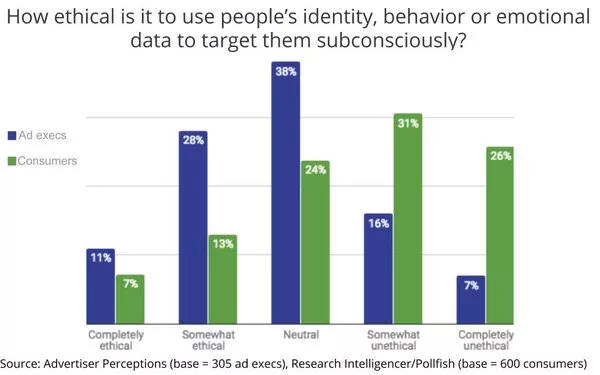
Therefore, committing to ethical marketing practices is not just commendable but essential. It’s a matter of learning to navigate the terrain adeptly, ensuring your actions align with your values without inadvertently sabotaging your efforts.
The history books are filled with examples of marketing missteps, many of which have left indelible marks on our collective consciousness. Some of the most notorious blunders include:
- The Pepsi commercial featured Kendall Jenner, where she seemingly trivialized the seriousness of the Black Lives Matter movement by handing a can of Pepsi to police officers during a protest.
- H&M’s controversial use of a young black child to model a hoodie with the slogan “Coolest Monkey in the Jungle” sparked accusations of racial insensitivity.
- Starbucks’ ill-conceived “#racetogether” campaign, which attempted to spark conversations about race relations between baristas and customers, was criticized for oversimplifying complex issues.
- Protein World’s “beach body ready” campaign faced backlash for promoting unrealistic beauty standards and body shaming.
Studies have shown that negative information tends to grab attention and linger in people’s memories longer than positive content. Even though these scandals may seem like ancient history, they continue to resonate, as evidenced by references in popular media like the Amazon Prime series “The Boys,” which parodied the Kendall Jenner ad.
To safeguard your reputation, learning from past mistakes and understanding which cases resonate with your audience is crucial. There are numerous paths you can take to engage in ethical marketing, such as:
- Supporting eco-friendly, animal-friendly, and sustainable practices.
- Advocating for inclusivity and body positivity.
- Championing social justice causes.
- Prioritizing privacy protection.
- Combining multiple ethical principles in your approach.
Whether through philanthropy, adopting sustainable practices, leveraging advanced technologies, or simply raising awareness on your online platform, there are countless ways to incorporate ethical marketing into your strategy. Let’s explore examples of successful ethical marketing initiatives to provide inspiration and guidance.
What is Ethical Marketing?
The concept of ethical marketing has evolved significantly over time, encompassing principles of honesty, transparency, equity, and fairness. Today, ethical marketing goes beyond mere product promotion, emphasizing values such as human dignity, solidarity, social justice, sustainability, transparency, and privacy protection. Here’s an overview of the premise and principles underlying ethical marketing:
- Expanded Parameters: In contemporary marketing, businesses are expected to uphold moral values and address societal issues alongside promoting their products. This includes advocating for human rights, environmental conservation, and privacy rights.
- Avoidance of ‘Crimes’: Ethical marketing requires businesses to refrain from engaging in misleading advertising, selling unsafe products, or abusing their market power. Additionally, actions that may be considered discriminatory, harmful, or disrespectful are to be avoided.
- Adherence to Regulations: Compliance with legal regulations, such as GDPR for user privacy protection, is essential. Moreover, ethical marketing extends beyond legal requirements to embrace practices that benefit consumers and society.
- Historical Context: Reflecting on past marketing practices, such as the glamorization of harmful habits or reinforcement of gender stereotypes, highlights the negative impact unethical marketing can have on individuals and society.
- Consumer Expectations: Today, consumers expect companies to use their influence for social good. Businesses are increasingly held accountable for their actions and are expected to contribute positively to society.
- Tactics for Ethical Marketing: Implementing ethical marketing strategies involves diverse approaches, including diversity and inclusivity in advertising, sustainability practices throughout the business operations, transparent data usage policies, and empathy-driven marketing.
- Importance of Trust: Building trust with consumers is crucial for long-term success. Unethical marketing practices can erode trust and damage brand reputation, leading to loss of customers and revenue.
- Market Trends: The rise of purpose-driven consumers and the growing importance of ecological sustainability, inclusivity, and privacy protection indicate that ethical marketing is not just a trend but a strategic imperative for businesses.
- Research and Development: Ethical marketing continues to evolve as researchers, businesses, and the public engage in further exploration of ethical principles and practices. Continuous improvement and adaptation to changing societal values are key aspects of ethical marketing.
Learn about psychographic marketing here.
Principles of Ethical Marketing:
- Honesty: Ethical marketing requires honesty in all communications and interactions with customers. This includes providing accurate information about products or services, avoiding deceptive advertising practices, and being transparent about any limitations or drawbacks.
- Full Disclosure: Ethical marketers believe in providing consumers with complete and truthful information to enable them to make informed decisions. This involves disclosing relevant details about product features, pricing, terms of sale, and any potential risks or side effects.
- Equity: Ethical marketing emphasizes treating all customers fairly and equitably, regardless of factors such as race, gender, age, or socioeconomic status. This means avoiding discriminatory practices and ensuring that marketing efforts are inclusive and accessible to diverse audiences.
- Fairness: Ethical marketers strive to maintain fairness in all aspects of their business operations. This includes fair pricing policies, fair competition practices, and fair treatment of employees, suppliers, and other stakeholders. Ethical marketing rejects exploitative or manipulative tactics that seek to take advantage of vulnerable individuals or communities.
Real-Life Examples of Ethical Marketing:
Ethical Marketing Example #1: FIO Athletics
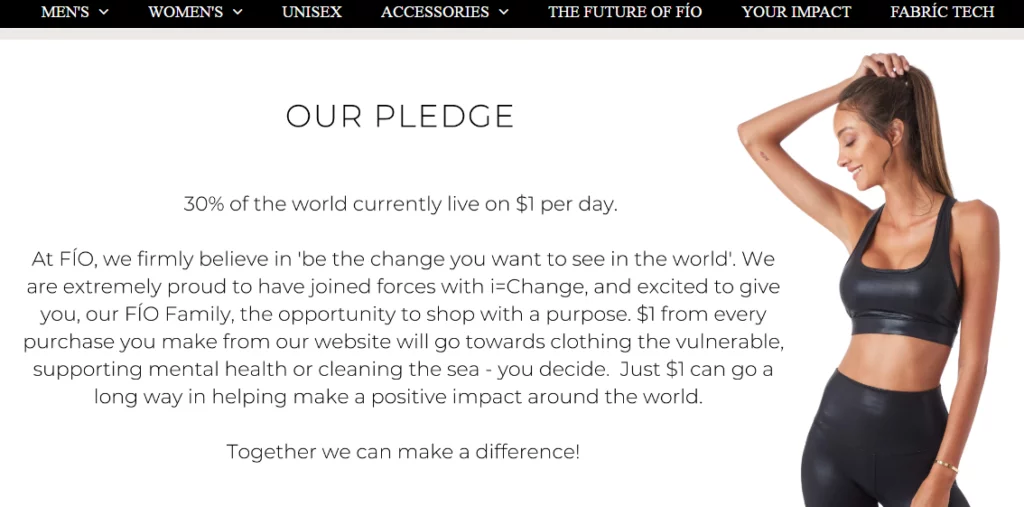
Did you know every dollar spent on FIO Athletics’ website can make a difference? Partnering with i=Change, FIO Athletics allows shoppers to contribute to charitable causes with each purchase. Here’s how it works:
- $1 from every purchase is donated to a charity of the customer’s choice.
- Shoppers can choose from organizations like Thread Together, which provides clothing to those in need; the Seabin Foundation, dedicated to combating ocean pollution; or Beyond Blue, focused on mental health advocacy.
Ethical Marketing Example #2: United By Blue
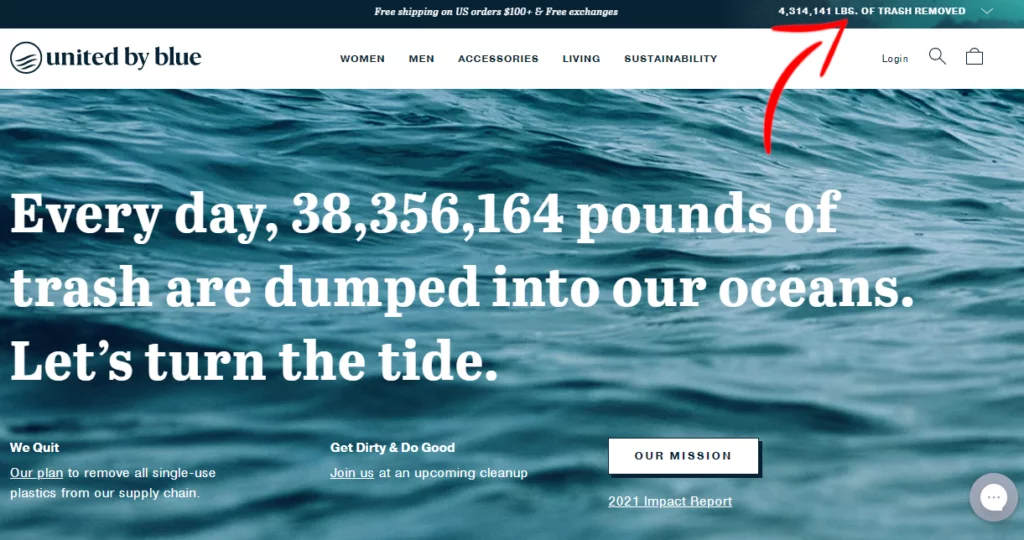
United By Blue is not just a clothing brand; it’s a commitment to environmental stewardship. They’ve been dedicated to cleaning up the planet since their first T-shirt sale. Here’s what sets them apart:
- Over 4 million pounds of trash were removed from the ocean through community cleanups.
- Products made from sustainable materials are made in GOTS-certified factories.
- Verification of ethical manufacturing practices by partners and suppliers.
- Creation of eco-friendly products like reusable coffee cups and meal kits.
- B Corp certification since 2011 and ongoing efforts to reduce single-use plastics.
Ethical Marketing Example #3: Cotopaxi
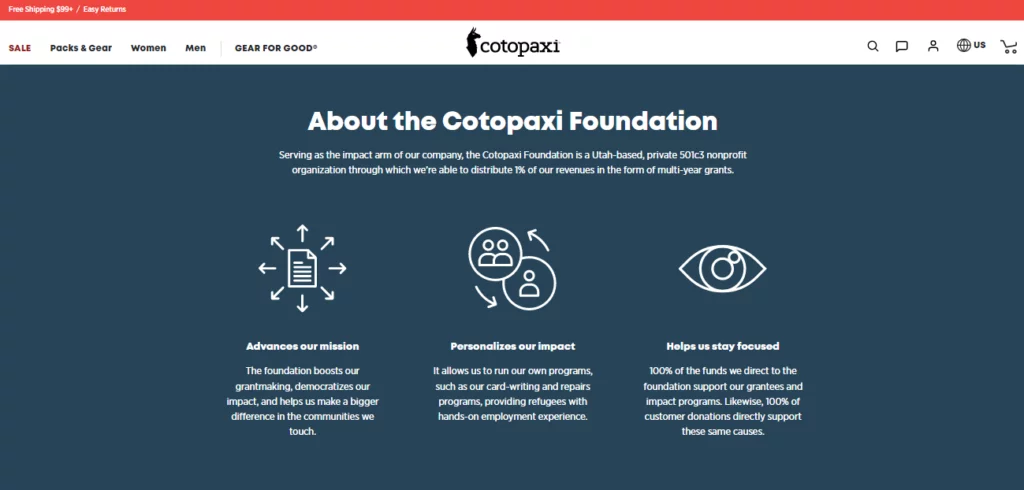
Cotopaxi’s “Gear for Good” program embodies their dedication to social and environmental causes. Here’s how they’re making an impact:
- The Cotopaxi Foundation channels profits to anti-poverty organizations and supports ecological initiatives.
- Collaboration with Bombas to aid homeless communities.
- Commitment to carbon neutrality and membership in 1% for the Planet.
Ethical Marketing Example #4: Virgin Atlantic
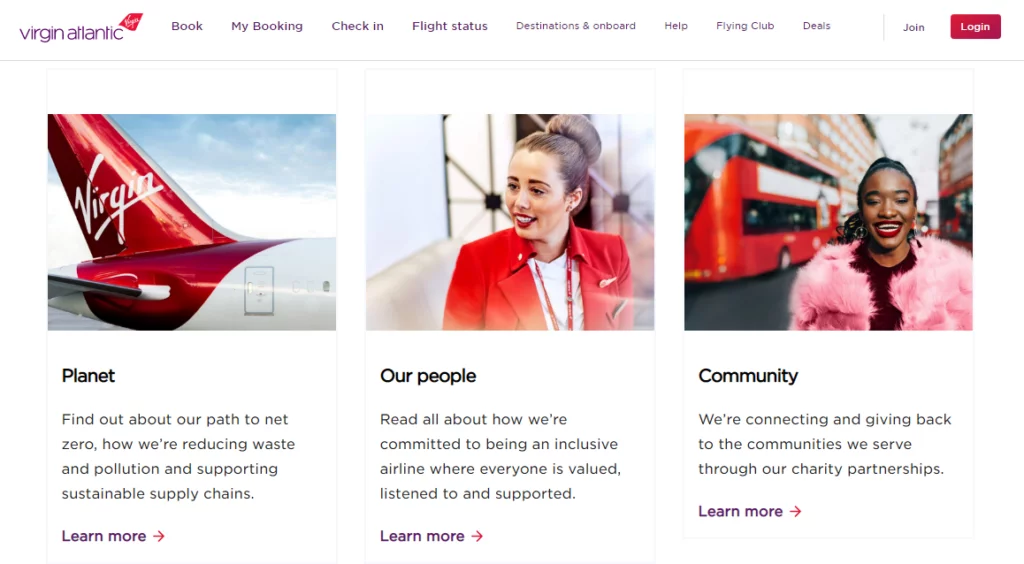
Virgin Atlantic is leveraging ethical initiatives to build a resilient reputation. Here are some of their notable efforts:
- Commitment to achieve net-zero carbon emissions by 2050 and implement sustainable practices like plastic recycling and green energy usage.
- Emphasis on diversity and inclusion with gender-balanced leadership and support networks for LGBTQ+ and ethnic minority employees.
- Passport to Change program provides grants and investments for STEM education initiatives.
Ethical Marketing Example #5: iNNBEAUTY Project
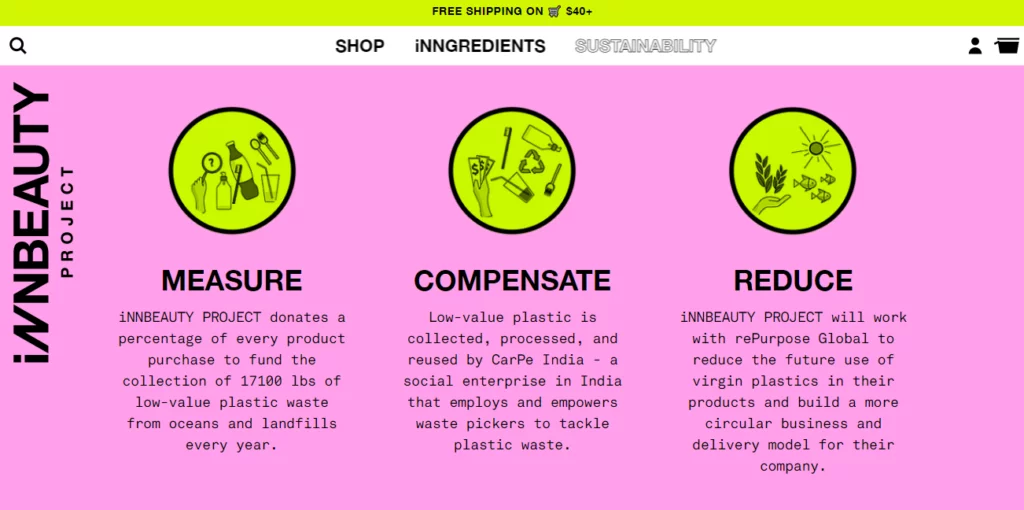
The iNNBEAUTY Project is revolutionizing skincare with a focus on sustainability and affordability. Here’s how they’re making a difference:
- Cruelty-free, vegan, sustainable, and non-toxic skincare products.
- Donation of a portion of revenue to fund plastic collection and collaboration with rePurpose Global to reduce plastic usage.
- Empowerment of women through female ownership and advocacy.
Ethical Marketing Example #7: Danner
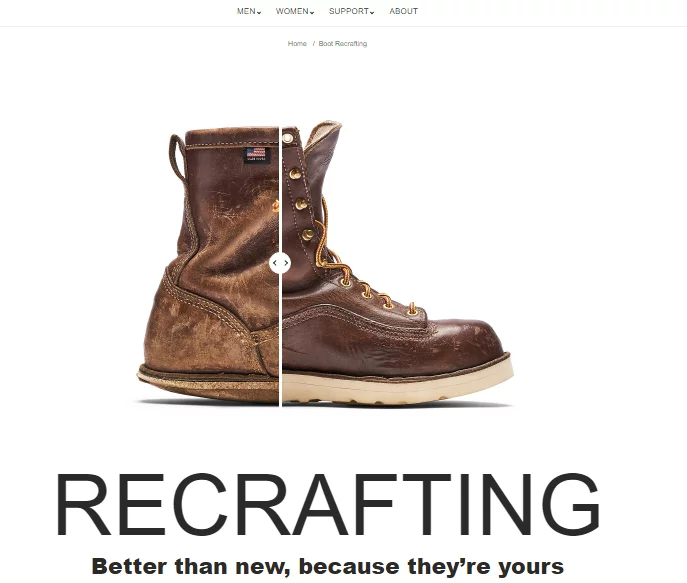
Danner recognizes the importance of preserving cherished possessions and reducing environmental impact. Here’s how they’re promoting sustainability:
- Recrafting Service: Danner offers a recrafting service, allowing customers to extend the life of their beloved footwear by refurbishing them instead of discarding them.
- Convenience: Customers simply fill out a form to send in their boots, and Danner’s expert artisans handle the rest, ensuring that quality footwear remains in use for longer periods.
- Environmental Stewardship: By encouraging reuse and reducing waste, Danner demonstrates its commitment to environmental responsibility while providing exceptional customer service.
Ethical Marketing Example #8: Apolis
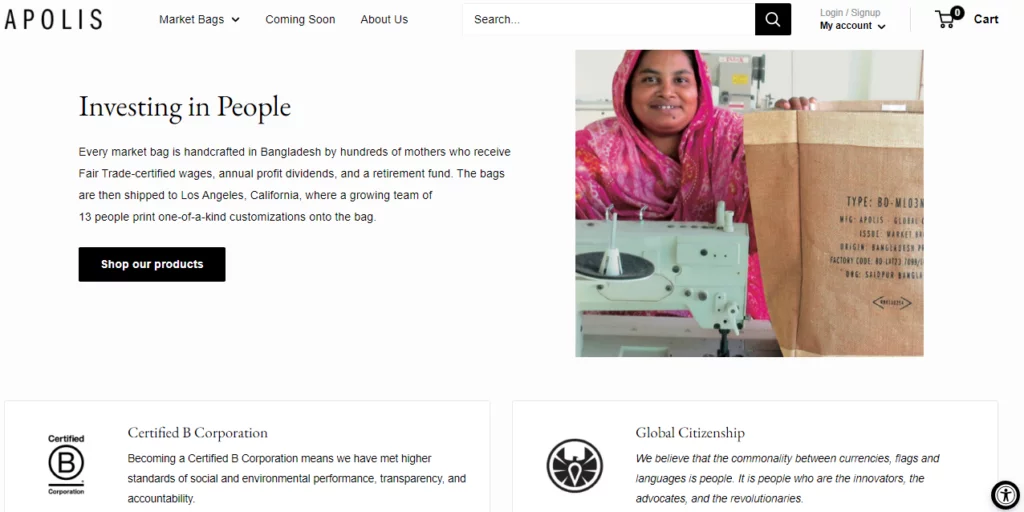
Apolis is committed to empowering marginalized communities and promoting global citizenship. Here’s how they’re making a difference:
- Apolis provides hundreds of mothers in Bangladesh with Fair Trade-certified job opportunities, annual profit dividends, and retirement funds, promoting economic independence and social mobility.
- As a Certified B Corporation, Apolis upholds rigorous social and environmental performance standards, transparency, and accountability.
- Through initiatives like the Global Citizenship concept, Apolis fosters inclusivity and cooperation, emphasizing our shared humanity and interconnectedness across borders and cultures.
Ethical Marketing Example #9: Soon Skincare
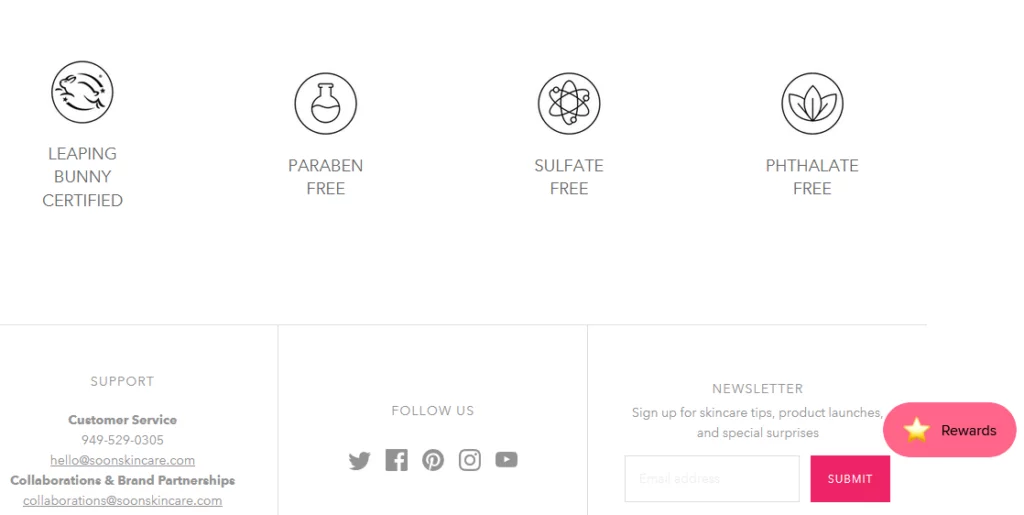
Soon, skincare will prioritize transparency and accessibility. Here’s how they’re promoting consumer trust:
- Soon, Skincare will provide an Ingredient Glossary on product packaging, empowering consumers to make informed choices about the products they use.
- By offering clear and concise information about product ingredients, Soon Skincare promotes transparency and accountability in the skincare industry.
- Soon, Skincare’s commitment to sustainability will extend beyond product formulation and encompass ethical sourcing, packaging, and production practices.
Ethical Marketing Example #10: Perfect Keto & Munk Pack
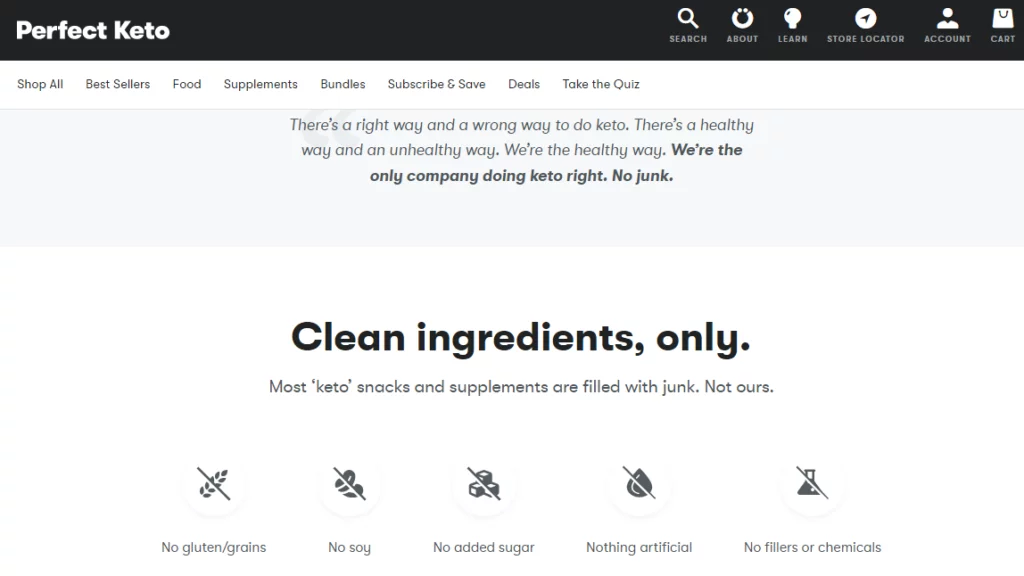
Perfect Keto and Munk Pack are revolutionizing the snack industry with their commitment to health and sustainability. Here’s how they’re leading the charge:
- Perfect Keto and Munk Pack offers a diverse range of tasty, healthy, and vegan snacks, catering to consumers’ dietary preferences and promoting balanced nutrition.
- Their snacks provide convenient, on-the-go options for health-conscious individuals, supporting active lifestyles and wellness goals.
- Perfect Keto and Munk Pack prioritize sustainable sourcing, packaging, and production practices, minimizing their environmental footprint while delivering high-quality products to consumers.
Ethical Marketing Example #11: Lunar Beauty
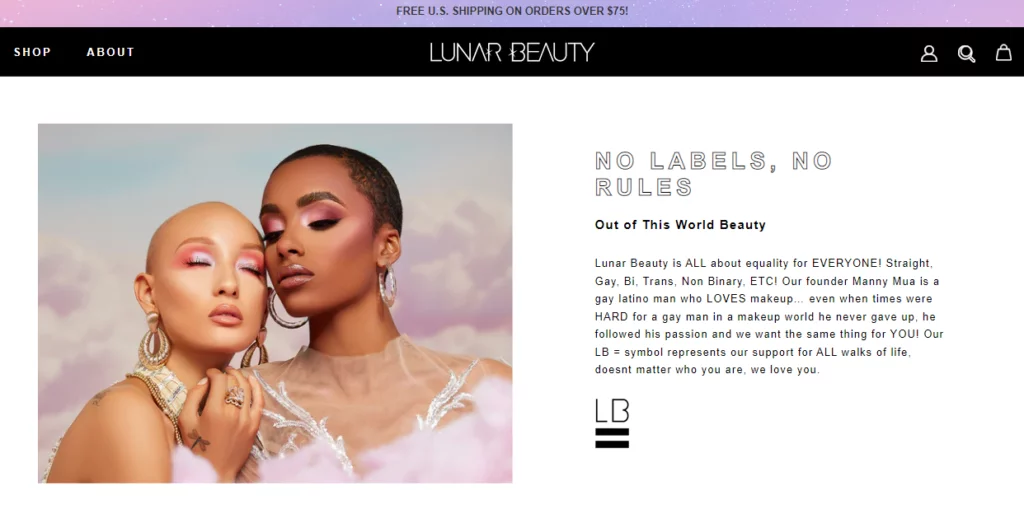
Lunar Beauty is breaking barriers and promoting inclusivity in the beauty industry. Here’s how they’re championing diversity:
- Lunar Beauty, founded by Manny Mua, a gay Latino, celebrates diversity and empowers individuals of all backgrounds to express themselves through makeup.
- By challenging gender norms and stereotypes, Lunar Beauty promotes inclusivity and acceptance within the beauty community, fostering a sense of belonging for all consumers.
- Lunar Beauty inspires individuals to embrace their unique identities and express themselves authentically, regardless of societal expectations or prejudices.
Ethical Marketing Example #12: Tropicfeel

Tropicfeel is revolutionizing travel and fashion with its sustainable business model and community engagement initiatives. Here’s how they’re making a positive impact:
- Tropicfeel’s “Nation” membership club encourages community engagement and environmental stewardship through various challenges and activities focused on sustainability and social impact.
- Members are rewarded for their contributions with exclusive perks, discounts, and customized experiences, fostering a sense of belonging and camaraderie among like-minded individuals.
- Tropicfeel is committed to transparency and sustainability, from product design to sourcing and production, ensuring that every aspect of their business aligns with their ethical values and environmental goals.
Conclusion:
In conclusion, ethical marketing is not only a moral imperative but also a strategic imperative for businesses. By adhering to ethical principles such as honesty, full disclosure, equity, and fairness, companies can build trust with their customers, enhance their reputation, and contribute positively to society. Ethical marketing is not just about doing what is right; it is also about creating sustainable value for all stakeholders in the long run.
FAQs on Ethical Marketing:
What Role Does Ethical Marketing Play in Corporate Social Responsibility (CSR)?
Ethical marketing is an integral part of corporate social responsibility (CSR) initiatives. By practicing ethical marketing, businesses demonstrate their commitment to social and environmental responsibility, contribute to the well-being of communities, and align with the values of stakeholders.
How Can Ethical Marketing Help in Building Brand Loyalty?
Ethical marketing can help in building brand loyalty by creating trust and credibility among customers. When businesses demonstrate honesty, transparency, and fairness in their marketing practices, customers are more likely to develop a strong emotional connection with the brand and remain loyal over time.
Are There Any Risks Associated with Ethical Marketing?
While ethical marketing offers numerous benefits, there are also risks, such as potential backlash if a business fails to live up to its ethical commitments or if ethical messaging is perceived as insincere or opportunistic.



